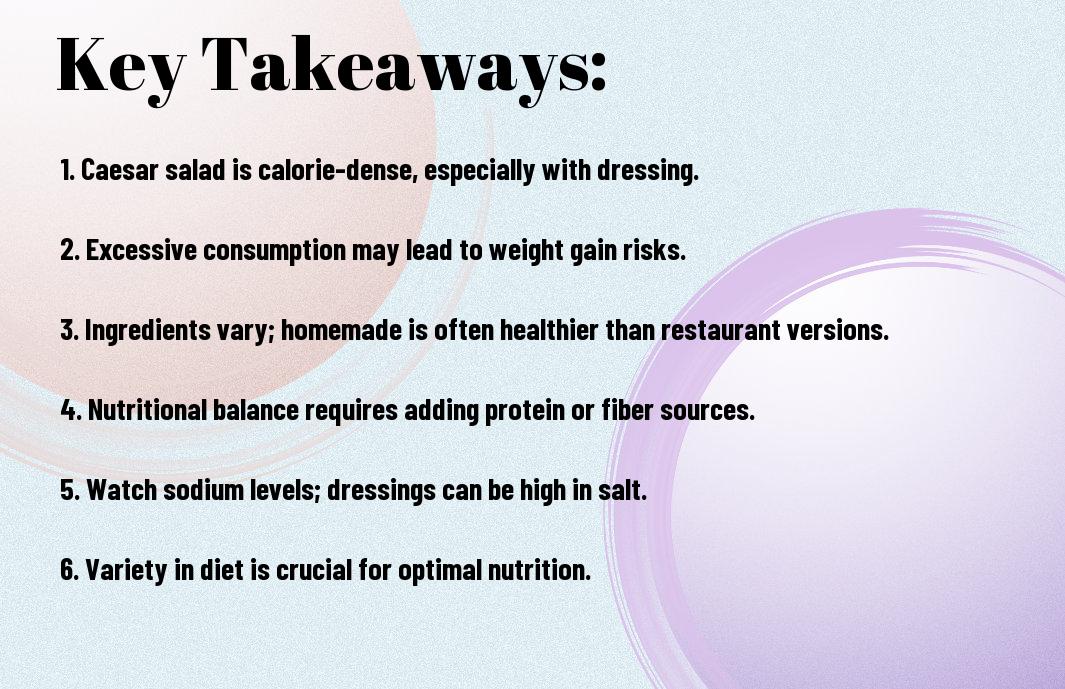Caesar salads are often considered a delicious and hearty choice for a daily meal, but is indulging in them every day truly beneficial for you? While this salad can offer nutritional perks, such as providing crucial vitamins and minerals, some key ingredients may pose health risks when consumed in excess. It’s important to examine both the positive aspects, like the presence of leafy greens, and the potential downsides, such as high-calorie dressings and sodium levels. Discover the balance between enjoyment and health as you navigate your everyday eating choices.

Key Takeaways:
- Consuming Caesar salad daily can provide a good source of nutrients such as vitamins, minerals, and fiber, especially if fresh ingredients are used.
- Be cautious of the high calorie and fat content in traditional Caesar salad dressings and toppings like croutons and cheese, which can lead to excessive calorie intake.
- To maintain a balanced diet, consider varying your salad ingredients and incorporating a wider range of foods to ensure you receive all imperative nutrients.
Nutritional Components of Caesar Salad
The Caesar salad is packed with various nutritional components that can contribute to your overall health. While it serves as a tasty meal option, it’s necessary to understand what you’re consuming through its key ingredients, caloric content, and macronutrient breakdown.
Key Ingredients and Their Benefits
About Caesar salads, the key ingredients include romaine lettuce, croutons, Parmesan cheese, Caesar dressing, and often protein like chicken. Each component offers unique benefits: romaine lettuce is rich in vitamins A and K, while croutons provide carbohydrates for energy. Parmesan cheese adds flavor and calcium, and the dressing can be a source of healthy fats when made from quality oils, balancing the overall nutrient profile.
Caloric Content and Macronutrient Breakdown
Before submerging into the specifics, it’s vital to note that the caloric content of a Caesar salad can vary significantly based on its ingredients and portion sizes. On average, a standard Caesar salad without protein contains around 300-400 calories, with fats, carbohydrates, and proteins making up the macronutrient distribution.
Further exploring the caloric content of your Caesar salad, you will find that high-fat dressings can lead to increased calorie counts, often ranging from 200 to 300 calories per serving. The addition of proteins like chicken or shrimp boosts the protein content, helping you feel fuller. However, be cautious, as too much cheese and croutons can elevate both calories and unhealthy fats, resulting in a dish that’s not as beneficial for daily consumption. Balancing portion sizes and ingredient choices is key to enjoying this salad healthily.

Health Benefits of Eating Caesar Salad
You may be surprised to learn that incorporating Caesar salad into your daily routine can offer various health benefits. This classic dish often includes fresh greens, which are high in nutrients, as well as protein from chicken or seafood. Additionally, the dressing can provide healthy fats, enhancing nutrient absorption and promoting overall well-being. However, moderation is key, as excessive consumption of certain ingredients may counteract these positive effects.
Vitamins and Minerals
For your health, Caesar salad can be a rich source of important vitamins and minerals. The romaine lettuce typically used in the salad is packed with vitamin A, vitamin K, and folate, which support various bodily functions, including vision, blood clotting, and cell production. Combined with other nutritious ingredients like garlic, lemon juice, and cheese, you can enjoy a variety of important nutrients.
Impact on Digestion and Weight Management
For your digestion and weight management, Caesar salad can be a valuable addition to your diet. The fiber from romaine lettuce and other vegetables aids in digestion, helping to keep your gut healthy. With the right ingredients, it can also promote a sense of fullness, which may assist in weight control.
Considering the impact on your digestion, a well-composed Caesar salad can help foster a healthy gut environment while keeping your caloric intake in check. The combination of fiber and protein in the meal can keep you satiated, potentially leading you to consume fewer calories overall. However, it’s important to be wary of high-calorie dressings and toppings, as they can quickly escalate your daily intake and diminish the benefits. Balancing your ingredients and maintaining portion control is key for maximizing the positive aspects of this popular salad.
Potential Drawbacks of Daily Consumption
Now, while Caesar salad can be a tasty addition to your daily meals, it’s important to consider the potential drawbacks of consuming this dish every day. These include concerns over caloric intake, sodium levels, and fat content that may not align with your health goals, especially if you do not account for the ingredients used in your salad. Understanding these aspects will help you make informed choices about your diet.
Excess Caloric Intake
Across various recipes, Caesar salads can pack in high-calorie ingredients such as creamy dressings and croutons. If you’re not mindful of portion sizes or the number of salads consumed, you may inadvertently exceed your daily caloric needs. This can lead to weight gain over time, compromising your overall nutritional goals.
Sodium and Fat Content Concerns
Behind the delightful flavors of Caesar salad lies a concern about elevated sodium and fat content. Many commercial dressings and ingredients can significantly contribute to your daily sodium intake, which may increase the risk of hypertension or other cardiovascular issues. Additionally, the presence of saturated fats in ingredients like cheese and dressing could lead to detrimental effects on your heart health if consumed excessively.
Sodium levels in Caesar salad can be alarming, with some recipes exceeding 1,000 mg per serving. High sodium intake is associated with increased blood pressure and can be a significant risk factor for cardiovascular diseases. Similarly, while fats are imperative for a healthy diet, the type and amount of fat matter. Regular consumption of Caesar salad featuring heavy dressing and cheese can increase your intake of unhealthy saturated fats, negatively impacting cholesterol levels and heart health. Balancing these factors can help you enjoy your salad while maintaining overall wellness.
Variations of Caesar Salad
Many people enjoy experimenting with different versions of Caesar salad to both enhance flavor and introduce variety into their meals. You can add elements like grilled chicken for protein, shrimp for a seafood twist, or roasted vegetables for extra nutrients. Additionally, you might try various dressings or toppings, such as avocado slices or Parmesan crisps, to create a bespoke take on this classic dish.
Healthier Ingredient Swaps
With a few savvy ingredient swaps, you can make your Caesar salad healthier without sacrificing taste. Opt for Greek yogurt instead of mayonnaise in your dressing to reduce calories and increase protein. You can also replace croutons with nuts or seeds for added crunch and healthy fats. Choosing whole-grain or homemade croutons can further elevate the nutritional profile of your salad.
Customizing Caesar Salad for Nutritional Balance
An optimized Caesar salad allows you to achieve a well-rounded meal by balancing macronutrients. You can ensure your salad contains a variety of textures and flavors while providing an adequate mix of proteins, healthy fats, and fiber. Adding ingredients such as legumes or quinoa enhances satiety and improves digestion. While tailoring your salad, be mindful of portion sizes and added fats to keep your overall caloric intake in check, ensuring you enjoy a nutritious and satisfying dish.
A well-customized Caesar salad doesn’t just cater to your taste buds; it also supports your health goals. By opting for a variety of colorful vegetables, you gain crucial vitamins and minerals, boosting your overall well-being. Incorporating lean proteins can help with muscle maintenance, while healthy fats from sources like avocado or olive oil offer sustained energy. As you tailor your Caesar salad, paying attention to not only ingredients but also portion sizes ensures you enjoy all the positives of this dish without the negatives, keeping your nutrition balanced.

Expert Opinions on Daily Consumption
All health experts agree that while Caesar salad can be a nutritious choice, consuming it every day could lead to some nutritional imbalances. Incorporating a variety of foods into your diet is necessary for optimal health, as different ingredients contribute different vitamins and minerals necessary for your well-being.
Nutritionists’ Perspectives
On discussing the daily consumption of Caesar salad, many nutritionists point out that while it offers benefits like fiber and vitamins from the greens, over-reliance on the salad could increase your intake of saturated fats and sodium from dressings and cheese, possibly leading to health issues.
Studies and Research Findings
At a glance, studies indicate that while salads, including Caesar, are generally healthy, eating them daily without variety might not support long-term health.
To maintain a balanced diet, you should consider research showing that excessive amounts of the dressing and cheese in Caesar salad can significantly increase your intake of saturated fats and sodium, potentially raising your risk of heart disease. Additionally, some studies suggest that relying on a single meal type can lead to nutritional deficiencies over time. Incorporating a broader range of vegetables and proteins is necessary for your overall health, helping you avoid the pitfalls of nutritional monotony.
Conclusion
From above, it is evident that while Caesar salad can be a nutritious addition to your diet, consuming it daily may lead to an imbalanced intake of certain nutrients. By incorporating a variety of vegetables, proteins, and healthy fats into your meals, you can enhance your overall nutrition. Ensure that you pay attention to portion sizes and ingredients to avoid excessive calories, sodium, and fat, particularly from dressings and cheeses. Balancing your meals with other food groups will foster a healthier lifestyle while allowing you to enjoy the flavors you love.
FAQ
Q: Can eating Caesar salad every day provide vital nutrients?
A: While Caesar salad can offer some nutrients, daily consumption may not provide a balanced intake. It typically contains romaine lettuce, croutons, Parmesan cheese, and Caesar dressing, which mainly supplies vitamins A and K, calcium, and some dietary fiber. However, to ensure a full spectrum of nutrients, it’s important to incorporate a variety of vegetables and protein sources into your diet alongside Caesar salad.
Q: Is it safe to eat Caesar salad daily for weight management?
A: Eating Caesar salad daily could contribute to weight management due to its relatively low calorie count, but it depends on the ingredients used. Traditional Caesar dressing can be high in fat and calories. To promote weight loss, consider using lighter dressings, limiting croutons, and adding lean proteins like grilled chicken or shrimp to make the salad more filling without excessive calories.
Q: Does daily consumption of Caesar salad affect cholesterol levels?
A: Caesar salad can impact cholesterol levels, particularly due to the cheese and dressing, which may be high in saturated fats. Consuming these fats in moderation is key. If you’re concerned about cholesterol, consider making a homemade dressing with healthier oils like olive oil and using less cheese or opting for a low-fat version.
Q: Can eating Caesar salad every day lead to nutritional deficiencies?
A: Relying solely on Caesar salad as a daily meal can lead to nutritional deficiencies. While it can be a part of a healthy diet, variety is important. A diet focused only on Caesar salad may lack vital nutrients like iron, omega-3 fatty acids, and certain vitamins found in other food groups. Including a mix of fruits, whole grains, and other vegetables is vital for comprehensive nutrition.
Q: What modifications can I make to Caesar salad for improved health?
A: To enhance the health benefits of Caesar salad, consider several modifications. Use a homemade or vinaigrette-style dressing made with olive oil, add a variety of colorful vegetables such as spinach, bell peppers, or tomatoes for added nutrients, substitute whole grain or baked croutons for a healthier option, and include sources of lean protein like grilled chicken, chickpeas, or tofu to increase satiety and nutrient density.
